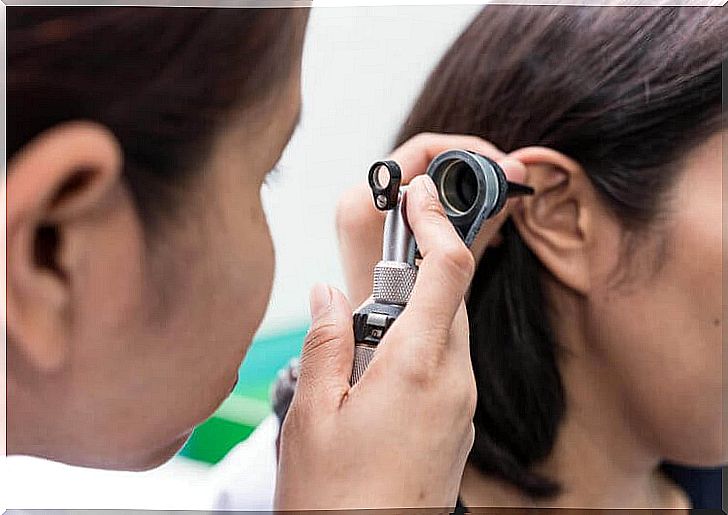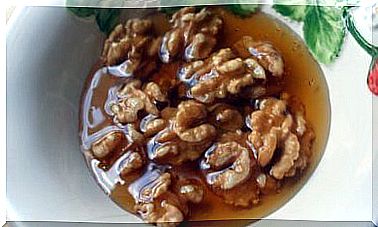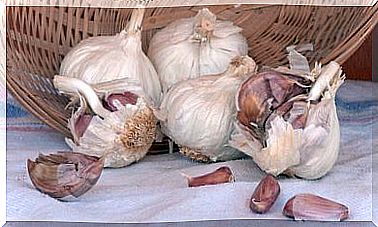Deafness: Tips And Natural Plants To Avoid It
The loss of our most important senses is always very unpleasant. The ear is one of the most sensitive senses, so we need to take care of it and react quickly if necessary.

Deafness is characterized by the total or partial loss of hearing. We talk about hearing loss when it decreases, but we can still hear something, and deafness when no sound is heard.
In this article, we are going to educate you about this condition and we are going to teach you some home remedies to relieve your symptoms.
Causes
Deafness has several causes. Some are curable and others are not. Here, we will present the most common, with some considerations on their respective severity.
- Foreign bodies in the ear canal: water, earwax. Usually it is easily cured.
- Fluid in the middle ear due to acute disease (pus). It is curable if you treat it in time.
- Lack of air in the middle ear, due to blockage of the eustachian tubes due to adenoid, cold or catarrh. If not corrected, push your eardrum inward. It is a curable problem.
- Arteriosclerosis of the blood vessels in the inner ear, produces necrosis or death of nerve endings.
- Inflammation of the eighth nerve or acute neuritis.
- Destruction of the nerve by a poison, such as quinine.
- Rupture of the eardrum which leaves a permanent perforation. Deafness can be partial.
- Catarrh, diseased tonsils, adenoids, repeated colds, sore throat and blocked nasal passages.
As soon as you realize that you are becoming deaf, you should see a doctor, preferably a specialist. He will take care to examine you carefully.
Symptoms
Symptoms suggestive of a principle of deafness can be easily checked and without too much difficulty. Among these we find:
- Need a great deal of concentration to listen to what others are saying or asking them to repeat what they have said
- Ringing ears
- Impression that others mumble
- Itching due to the presence of fluid
- Likewise, in the most severe cases, severe pain may appear, often associated with the rupture of nerve endings.
When there is sudden deafness, the person notices it because they start to hear clippings in what they hear. In children, suspected signs of congenital deafness are:
- Difficulty learning to speak
- Learning problems
- Changes in their behavior
Complications

It is a problem that can have a very big effect on a person’s quality of life. The most reported problems in adults due to deafness are:
- Depression
- Anxiety
- Feeling that others are angry
It is very common for most of those who are deaf or partially deaf to live with these difficulties for years before seeking treatment. It can also cause problems for those they live with at home or at work.
Advice
- It is advisable to avoid impulsive noises. Music should not be listened to above 110 decibels, as early hearing loss can occur.
- No foreign object or substance should be introduced, as these can push the wax inward and damage the eardrum.
- It is advisable to clean only the outer part of the ear with gauze or a towel. Do not run your fingers to clean your ears.
- Great care should be taken when playing contact sports, they can also cause trauma in the ear area and cause problems.
- In the event of continuous exposure to noise, you must use hearing protection.
Natural plants to treat deafness
Marjoram
This herb is recommended to treat hearing loss. Due to its hypotensive and anti-arteriosclerotic properties, it can help the person suffering from the disease because it regulates blood pressure.
Ingredients
- 1 tablespoon of marjoram (15 g)
- 1 cup of water (250 ml)
Preparation
- In a saucepan, first bring the water to a boil.
- When it reaches its boiling point, then add the marjoram, cover and let stand another 2 minutes.
- Remove from the heat and let stand for 5 minutes.
- It is recommended to take two cups a day.
Onion

Due to its infinite number of properties, it is very suitable for the circulation of the blood, it prevents the formation of clots, it is an antibiotic and an analgesic.
Ingredients
- 1 onion
- 4 cups of water (1 liter)
Preparation
- Grind the onion and place it in a bowl.
- Then add the liter of water.
- Let stand 12 hours before consuming, so that it concentrates.
- Then take it three times a day.
Garlic
Garlic has excellent properties, antibiotic and anti-inflammatory properties, which is of great help for this type of situation.
Ingredients
- 1 clove of garlic
- 1 tablespoon of olive oil (15 ml)
Preparation
- First, grind the garlic until you get a paste.
- Then heat the oil in a pan and add the garlic.
- Press with a spoon to release its extracts.
- With a dropper then place three drops in each ear. You can also repeat the application several times a week.
ginkgo biloba
Due to its properties, it improves blood flow, increasing the oxygen supply to the brain. It is ideal for keeping the ears healthy and free from discomfort.
Ingredients
- 1 tablespoon of ginkgo biloba (15 g)
- 1 cup of water (250 ml)
Preparation
- In a bowl, first boil the water. When ready, then add the tablespoon of ginkgo biloba.
- Cover and let stand for 5 minutes.
- It is recommended to drink one cup per day.
Discomfort in the ears or lack of hearing usually occurs in old age, but there are many factors that can produce it. That is why we have to take care of our vital senses, in order to lead a more comfortable life.
If you are already suffering from it, the natural remedies taught above will be of great benefit to you. However, if your case is very serious, it is best to see a specialist immediately.









